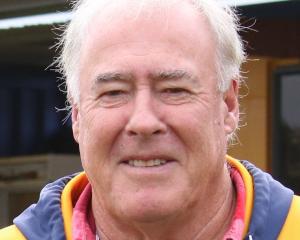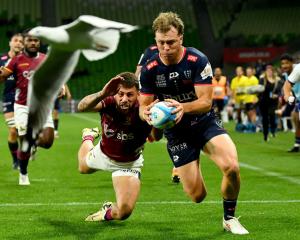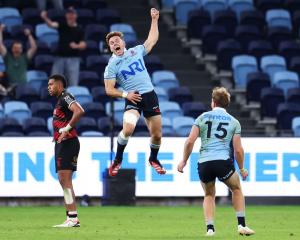As this year's edition of the Rugby World Cup nears, ODT Online rugby writer Jeff Cheshire looks at some of the things we have learnt from previous tournaments.
The ref can be a wildcard
Regardless of whether you think a referee really cost a team a game or not, there is no denying that the way a referee calls a game can favour one team over another. Some will take a fairly liberal approach, letting virtually anything go and leaving it up to the players to come up with counters to opposition exploits. Others will call absolutely everything, something that tends to slow a game down, create a messy encounter and prevents either team putting many phases together.
Different teams prefer different approaches and from a New Zealand perspective, it would be better to have a referee who would let the game flow. Although you do not want it to go too far the other way either.
Even things such as which way they go with a 50-50 decision can determine the outcome of a game. It is hard to imagine a referee at this level ever legitimately cheating, although there have been instances where refereeing decisions, or non-decisions, have had a profound impact on the outcome of a World Cup. You have to try to take that out of the equation as best as you can, or at least adaptto how the referee is calling the game.
Injuries can hurt
Rugby is a team game and having depth is great, but the reality is that every team has key players that they they would not want to lose to injury. Four years ago the All Blacks scraped through after losing three first fives and their first choice halfback, while their captain got through the business end on one foot. But it does not always work out so well.
In 2007 the All Blacks lost their two first choice first fives in one game, their last one, and the lack of someone to take a drop goal to close the game out became apparent. Four years earlier it was Tana Umaga who went down in the first game and never got back to what the selectors deemed as "match fit". In 1991 you had a key man in Mike Brewer, who was controversially left out due to an injury. The 1995 team had their own fitness issues with illness sweeping through the team just days before the final.
At the first World Cup the All Blacks lost their captain, Andy Dalton, although proceeded to uncover a superstar in Sean Fitzpatrick, who kept his place even after Dalton returned. Injuries and illness have been such a big part of World Cup campaigns that it is hard to imagine them not having an effect this time around. How severe they are and how you cope with them are what will determine how big an impact they have.
Experiments sometimes go wrong
Remember when the All Blacks decided to play Christian Cullen at centre because they couldn't fit four players into the back three in 1999? Or in 2003 when they passed over the back-up centre they had chosen, Ma'a Nonu, and used Leon MacDonald to replace Tana Umaga? Or when in 2007 they still had not got the message, this time using the best fullback since Cullen, Mils Muliaina, in the No. 13 jersey? All were class performers, particularly Cullen and Muliaina, but were all wasted playing in a position they were not experienced enough in at the top level. You are better off picking a not so good player who actually knows how to play a position, rather than throwing a superstar into the deep end and forcing them to learn on the job. That is risky and it is a risk that does not always pay off. Definitely something worth considering when it comes to figuring out the positional splits in this year's squad.
Intensity goes up a level
The thing you notice about World Cup games, particularly throughout the later stages, is that the intensity is so much higher than at virtually any other time. People like to say that World Cup knockout games are tight affairs that rarely see expansive play. To an extent that is true, but it does not mean they have to be.
A better way of looking at it is that everyone is so up for these matches, that the speed and physicality of the game is such that it is hard to play an open game. There is far less space to attack in, while breakdowns are attacked with more ferocity, making it necessary to commit more players to protect the ball. Everyone is that much more desperate and they will find the extra energy to make that impossible covering tackle, or to keep exhibiting fast line speed when they would normally start to tire. Whereas normally some teams will get by with playing off passion for 60 minutes, then fade late in the game, in a World Cup that energy can last right through till the 80th minute, making them that much more dangerous.
Everyone brings their best for the All Blacks
Before nearly every World Cup the All Blacks have been put up on a pedestal as the world's best team and dubbed favourites to win the tournament. When you are on that pedestal though, everyone wants to knock you down and given you are normally up there for a reason, they know it will take a monumental effort to do that. Long story short, teams turn up at their best to play the All Blacks. In a World Cup there are no second chances and if they do run into the New Zealanders in the knockout rounds, then that is just a challenge they have to rise to.
For the All Blacks, that can be tiring, as when you are constantly facing teams like this you are likely to slip up every now and then. But they cannot slip up in one of these games. It is on them to make sure they are up for every match as much as they can be. Perhaps not so coincidentally, the two World Cups where the All Blacks did not have the usual pre-tournament expectations - in 1987 and 1995 - they achieved two of their three best results. Even in their 2011 victory they only just escaped against a French team who embodied the word passion, scrambling in the first half and then preventing the All Blacks from getting into scoring positions in the second.












